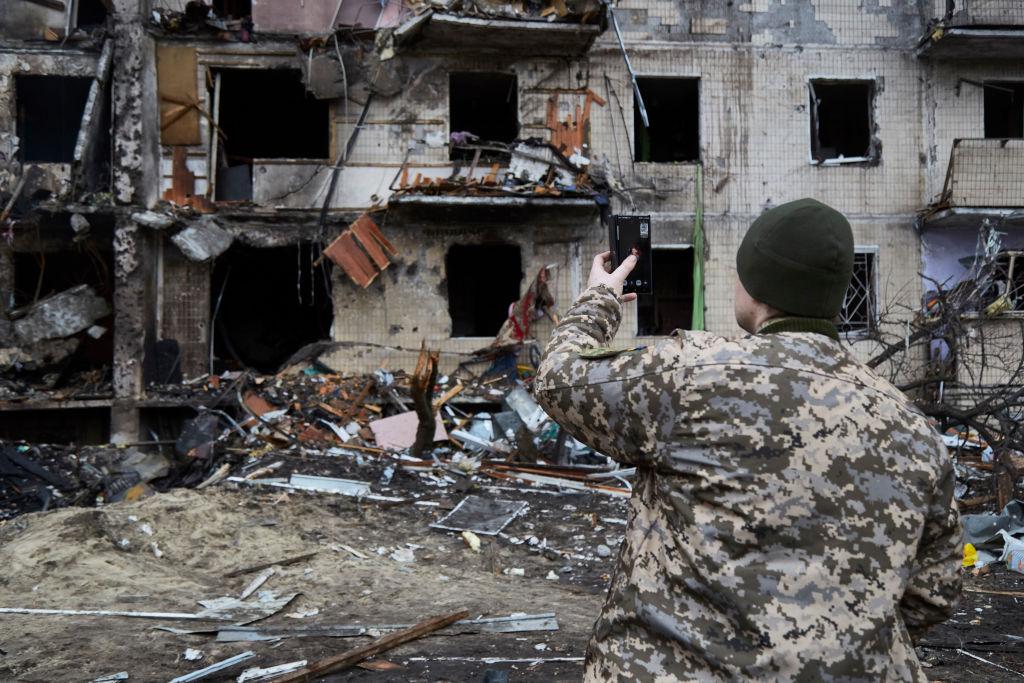
Russia grinds towards military objectives in Ukraine as the first smartphone war confounds and surprises.
Networked warfare meets networked people. The fog of war turns to patches of mist.
Modern weapons with all the sensors of a smartphone offer the military new ways of fighting, while digital citizens use new ways of seeing and acting to shift the war calculus.
The world now has billions of digital citizens, linked by the passport they share—the device that’s constantly in their hands.
The smartphone mindset is shaping understandings of secrecy, intelligence and war.
In the court of global opinion where digital citizens dwell, Russian President Vladimir Putin has lost any ‘just war’ justification. His military assault is in no way proportionate and responds to no immediate threat. No more baloney, please—realist or Russian—about how this is the fault of NATO and the US.
Putin is bumping against the first three indictments laid at the Nuremberg trials after World War II—plotting and acting to wage aggressive war, and breaking international conventions on war crimes. We tend to remember as the defining element the fourth count that created new laws about crimes against humanity. Yet the Nuremberg prosecution concentrated on proving the first three charges to show that then, as now, a cynical regime—the government as gangster—schemed to achieve war.
In Ukraine, smartphones help win the information battle while doing the detailed work of documenting war crimes. Non-government organisations are archiving evidence collected from social media and mobile phones, aiming to secure material to the standard of evidence. Around the world, amateur open-source researchers are doing much to analyse and explain the conflict to their fellow digital citizens. Such evidence can flow to the International Criminal Court, which has opened an investigation into possible war crimes and crimes against humanity.
As open-source intelligence challenges the government monopoly on intelligence, Ukraine marks another remarkable transformation—the moment when Western powers started giving away the intelligence jewels.
In the four months before the war, the US shredded top-secret taboos to reveal detailed information about Russia’s build-up to war. The extraordinary series of disclosures happened almost as quickly as secrets were collected and assessed.
US intelligence used ‘a rebuilt source network in Russia, government and commercial satellites tracking the movement of Russian troops, an improved ability to intercept communications, and even open-source material culled from Russian social media’. And then Washington told everybody, quick and loud.
Going public, the US exposed Putin’s preparations and stripped away his pretexts and pretence. When the attack began on 24 February, Russia’s military achieved no shock and little awe.
In the shrouded and conservative bureaucracies of intelligence, giving away secrets is an offence against nature as much as a breach of security. Yet it worked amazingly well. Vanquish the grey zone by casting lots of light. Tell the truth and do it fast. Free the facts to fly out to beat the lies. Win the information war by giving the best information.
Using speed and openness to communicate seems natural enough to the digital citizens (and the first smartphone generation is percolating up though the bureaucracies that so value secrets).
When did you last see headlines about a triumph for Western intelligence agencies? Among the benefits of the accurate intelligence alert was the time the US and Europe had in which to prepare Putin pushback.
The West has unleashed economic war against Russia’s war, freezing its foreign bank accounts. The crushing sanctions and ‘instant immiseration’ of Russia, The Economist wrote, mark ‘a new era of high-risk economic warfare that could further splinter the world economy’.
The global financial system may never be the same again. Russia—and China—won’t in future put trust, or much cash, in Western banks.
Russia is being cast out of the smartphone world. Savour the symbolism of Apple’s announcement that it’ll no longer sell its cell phones in Russia.
If there’s any shock and awe happening, it’s Moscow’s amazement at the size of the sanctions. This is not what Putin expected from the decadent, declining democracies, always willing to sell their souls for a dollar.
What Putin seizes, he then must try to hold. Or as the great strategist Lawrence Freedman comments: ‘This is a war that Vladimir Putin cannot win, however long it lasts and however cruel his methods.’
The conundrum is expressed these days by the simplest of sentences: How does this end? Peering for a path to peace, Freedman poses his own, more hopeful question: ‘Can a war launched on lies be stopped with the truth?’
If Putin grinds on, the smartphone war may just deliver regime change in Russia rather than Ukraine.
That thought tantalises the thinking of Australia’s chief spy, who sat down for a rare on-the-record chat with the Australian Financial Review. The head of the Australian Secret Intelligence Service, Paul Symon, offered this analysis:
The public is now seeing President Putin as a quite lonely man, a quite vulnerable man. You can see that in his body language. He is increasingly taking personal responsibility for all of the judgments, the mistakes and operations that Russia undertakes, and he will be held accountable for that.
Putin brooks no dissent. But he is becoming more, not less, vulnerable. It’s too hard to speculate on his future just yet, but the emerging trend of personal miscalculation, combined with the loneliness of supreme leadership that he seems to prefer, does not augur well for his future.
A drama critic’s judgement on a performance of Shakespeare’s Henry V applies equally to Putin’s folly: ‘[T]his kind of war—waged dishonestly for territory and self-aggrandisement—is murder in uniform.’